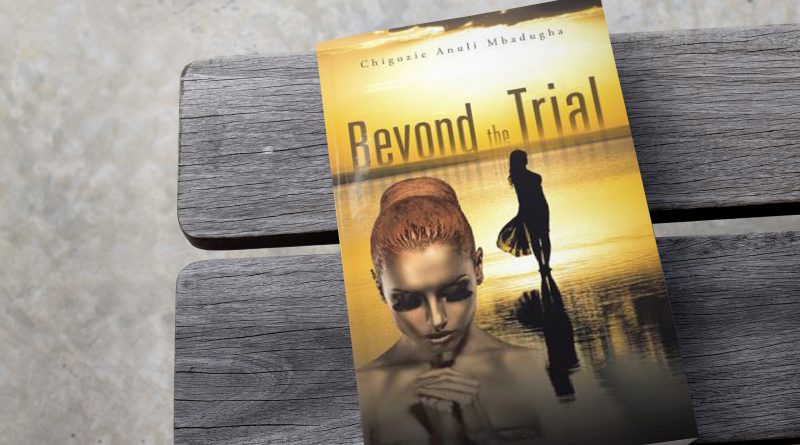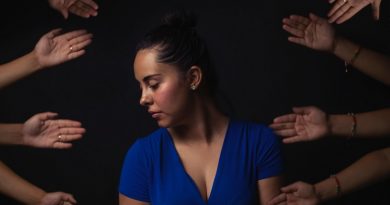Beyond the Trial: A Book Review
Chigozie Anuli Mbadugha’s first published novel, Beyond the Trial, is a collection of three short stories about three women who choose to see life beyond their trials and dare to reach for it.
Title: Beyond the Trial
Author: Chigozie Anuli Mbadugha
Length: 195 pages
Genre: Fiction (Short Stories)
Publisher / Year: AuthorHouseUK/2015
Source: Efioanwan “Fifi” Edem
Rating: 5/5
Why I Read It: To write a professional review
Date Read: 30/01/16
“In life, we are often not able to choose the trials and challenges we face. But our response to them is ours to choose”
—Chigozie Anuli Mbadugha, Shadows from the Past
Read: How To Self Publish Your Novel
The first story, ‘Erased Reproach’, is the story of young love and ruthless heartbreak. Funke, a teenager at the beginning of the story, gives in to peer pressure and, ignoring all the red flags and the instinct to talk to her mother about the strange values being presented to her by friends, ends up with an unwanted pregnancy which leads her into forced exile from her childhood home.
In ‘Rude Awakening’, Nkechi’s eutopic world is brought to a rude halt when her husband of eleven years dies suddenly in a car accident. She must face a chequered future alone with three sons. Woven into Nkechi’s story is that of her own mother who became a widow by the slight of her husband, if not by bereavement; it is a side story which calls the reader to take a broader view to widowhood.
A family’s past is haunting its members in ‘Shadows from the Past’ and it is Ada’s responsibility, indeed her calling as the firstborn child, to lead her entire family out of darkness and into the light. A long-postponed visit home opens a can of worms about the past and provides the opportunity to deal with it and put it well behind them all.
In choosing to write about the ills that women in our society have to struggle with, Mbadugha joins women writers like Flora Nwapa and Zainab Alkali to illuminate the disquieting space that women occupy in a man’s world. Without burning bras, she takes away the excuse for our silence, or complacency, or even our participation in meting out these evils to women. She is a woman using her writing to challenge us NOT to turn a blind eye to the plight of women when they fall on hard times.
The stories in this collection are, unfortunately, all too common-place. They are not in any way original subject matters – not the story of teenage pregnancy, or widow disinheritance, or growing up in an abusive home. However, each woman’s story is at once familiar and different. Mbadugha does this book justice when she puts forward characters that are so well-rounded that their individual journeys are worth following.
While all short stories in a collection are not generally required to have a single, overarching theme, it is always interesting for me to see the connection that a short story writer makes between each story in a collection, especially so for a collection of this sort. My quest for a common thread yielded a surprisingly well-bound cord.
First of all, we see the women in each of these stories facing a form of crisis of identity or the other. There is Funke, a typical teenager who wants to belong and who falls victim to peer pressure as a result. Funke soon realizes the foolishness and danger in following the often misinformed and misguided crowd and decides to intentionally remove herself from those influences. Then there is the young wife, Nkechi, who is sheltered (albeit against her will) by a doting husband. Nkechi has to find her own individual strength and will to carry on without him. She becomes the breadwinner when he dies unexpectedly. And then there is Ada, another young woman coming out of the shadow of an abusive father and into her role as the protector of the other members of her family.
Again, the stories portray the sense of neglect and rejection that women too often feel in the face of trials; whether through the story of abandonment by the partner in an unwanted pregnancy, the one dealing with early widowhood, or that of growing up with an emotionally absent father and a helpless mother, that sense of neglect is palpable.
Further, there is the echoed theme of triumph, and how courage, determination and focusing inward and forward helps the women break through the difficulties thrown in their path by fate.
On this last point, it is comforting to note that Beyond the Trial is the exit point of pain and suffering in the lives of its protagonists and not a meaningless or masochistic excursion into the woes of womanhood. Each woman grows because of the challenges inherent in her circumstances. When we first meet Funke she is a naïve, impressionable teenager who believes that, like herself, all her friends are virgins.
She becomes a wise and independent young woman in the end; Nkechi starts out as a sheltered young woman, but when she is exposed to harsh traditions and disloyalty from family members, she reaches deep inside to find great individual strength to carry on for the sake of her children; Ada is at first rebellious of the chokehold control of an abusive father, but her self-preservation instincts mature into an instinct to protect and defend other members of her family.
The author makes many useful submissions and offers much insight in this book. For instance, everyone, but especially young people with their lives well ahead of them, will benefit from Grandma Akande’s sage advice to forget the mistakes [and the troubles] of the past, but not the lessons learnt from them (Erased Reproach, P. 24). Also, the author identifies education as the key to escaping the life of drudgery and penury (Erased Reproach, P. 28). For the illegitimate child, it is prescribed that a lack of avarice and the willingness to work hard will guarantee a good future despite an unfortunate beginning (Erased Reproach, P. 39). Men are cautioned to put ego and pride aside and consider reasonable inputs from their women to forefend trudging many troubled paths that they might have avoided (Rude Awakening, P. 120). There is the admonition, too, that living under the shadow of one’s past will only result in limitation (Shadows from the Past, P. 193).
Yet this book does not give any false notions that any one thing—a good home training or education, for example—will preclude mistakes from happening or misfortunes from occurring. In real life, the opposite is often the case; it is the cruel irony of life. Rather, the reasoning seems to be that each one of us should come to terms with the hand we’ve been dealt in life and find the strength within us to beat our instruments of pain into instruments for escape and salvation.
Three times Mbadugha’s protagonists are dealt an unsavoury hand by fate, three times they overcome and become stronger for it. The stories, over and over, make this point that mistakes will be made despite our best efforts and trials can break through our ivory towers of comfort or privilege, but that we have the choice to turn around our mistakes and misfortunes and make them into stepping stones. The author uses the stories to emphasize that life beyond a trial—whether we ourselves are the architects of our troubles or they are the ones that other people or society thrust on us—does not have to be bleak, but that trials can be the crucible that helps us form character.
Interestingly, escape and salvation in Beyond the Trial does not translate to leaving the shores of Nigeria. But perhaps, this is more telling on our society than anything else. The African society is one where women often feel cornered and trapped. It is a society that exploits the vulnerability of women to relegate them. Women in many underdeveloped societies have had to fight hard to earn a position that a man might have for the taking. They have had to fight for equality, respect, and worth in the eyes of society. The challenge then is that we create the same kind of liberality and equal opportunity society that is to be found beyond our shores for women right here at home, that we begin to tend the grass on our side of the fence.
On a hopeful note, Beyond the Trial illustrates a gradual mental shift that has already begun to take place, in terms of how women now view themselves and their blossoming sense of self-worth, at least. While the older generation of its women have felt that they have to endure so much to keep their men happy and their homes together, the younger, more educated women are having none of it. Mbadugha’s younger female protagonists do not give in to the hopelessness of their situations; they are refusing to be relegated, or to become bitter and resentful. They do not accept labels society would like to put on them, or how it makes them out as unfortunate, disadvantaged, downtrodden, and mere castaways simply because of their unfortunate circumstances of life, even when their troubles are not of their own making. They do not wallow in self-pity or cower from their problems or throw sighs at them.
But then these women have not been alone in their trials and struggles. They have had more supportive, compassionate men who have given up the roles of men as oppressors to embrace that of men as protectors and defenders. They have had strong allies and wise counsel. And, there is a lesson in this, I think. The author wants to remind us that society did not get the way it is without the contribution of its members; and that everyone has a hand in the emancipation of women from the shackles of mental, emotional, economic, and sometimes, physical slavery. She wants every woman who finds herself buffeted by trials to remember that there is always someone whose strength she can lean on in times of trouble and that no one should have to go through life alone. She wants her to look to God, ultimately.
And so, the protagonists of Mbadugha’s Beyond the Trial choose for themselves to go forward without bitterness, resentment or vengefulness, and to groom themselves into strong, admirable and successful women through their troubles. On the other hand, the men who have been their nemesis stew in their own bitter juices. The author certainly makes a point of leaving her antagonists lodged in their past, trapped, as it were, by their own mischief and wickedness, fit only to be looked upon with contempt or, at best, pity. In Mbadugha’s book, this is revenge enough and their apparent stagnation proves that revenge is sweet when it is spread out as a buffet.
Beyond the Trial delivers the happy ending that is often dismissed as sterile. But these women’s happy endings are hard-fought and well-earned and it would be sadistic to desire any other outcome for them.
In Beyond the Trial are stories about suffering and injustice, but more importantly, they are stories about triumph. The author gives the prescriptions for replicating these triumphs in the reader’s life mostly through sage, conversational dialogue. And, Mbadugha’s wisdom is like the wisdom of a mother—gentle and running deep, and delivered in simple language.
If it may be summarized, Mbadugha wants women to pick their battles carefully (each of the women concentrates her energies on developing herself rather than fighting the architects of her troubles); she wants them to select their allies carefully (Funke has Grandma Akande, Nkechi has her best friend Uzoma, and Ada’s husband is her fortress); and lastly, she wants them to stay the course (eventually time heals the wounds of all three women).
Beyond the Trial is peppered with so much good advice at the turn of every page, and it will make many a woman (or man) wiser to have read it.
Efioanwan “Fifi” Edem is a book editor and blogs at newbooksnigeria.wordpress.com





